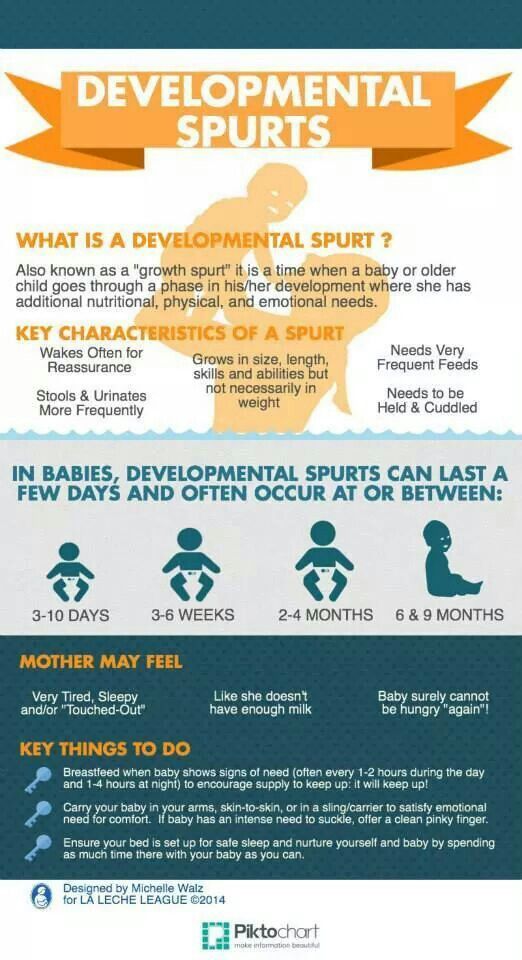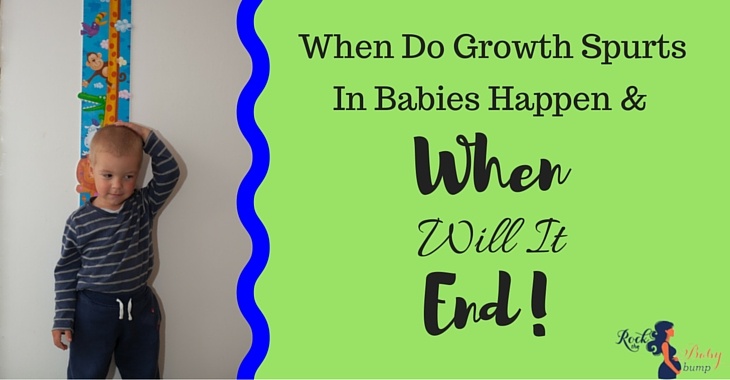It happens to us all: just when you and your baby have a semi-reasonable schedule worked out, a growth spurt strikes and that mutual understanding you two shared is out the window.
Parents who want to be prepared for this sudden change often ask, “When do growth spurts in babies happen?” and “How can I be ready for them?”
Though it is impossible to know when a growth spurt is reliably going to happen, you can be prepared for them.
Baby’s Number One Objective: To Grow
Your baby is taking his job seriously and intends to keep on growing, whether you like it or not.
By the time your wubsy is about 12 months old he will have tripled his body weight and that tripling of weight and length usually happens in fast and furious bursts.
So if you have been scratching your head and wondering if you shrunk your baby’s newborn clothes in the dryer, you probably didn’t.
He really did outgrow those clothes overnight (as for all of those cute outfits he never wore, make some bonus cash and sell them!).
An Approximate And Completely Unreliable Growth Timeline
Growth spurts can happen any time and anywhere, but there are some incredibly loose periods of time when you may be able to reasonably expect your baby to go through one:
- Between 1 and 3 weeks
- Between 6 and 8 weeks
- At around 3 months
- At around 6 months
- At around 9 months
Again, these growth spurts are not set in stone.
So if that chatty mom at playgroup is bragging about how her baby is “x” length, already weighs “x” pounds and is going to be tall like his pappy, don’t worry about your smaller sized bubs.
He, too, shall grow.
Signs Your Baby Is In The Midst Of A Growth Spurt
The first sign is that the adorable onesie you love to dress your bay in is now busting at the seams.
But there are other signs that will tell you that you are in the midst of a growth spurt.
- A Change In The Sleep Schedule
Seriously, just when you think you have it down, babies change the sleep schedule up on you.
During a growth spurt your baby will either:
- a) Sleep like a log (and for long periods), or
- b) Be awake and partying all night and day
Thankfully the majority of babies will need extra shut-eye and will sleep more than usual.
Unless it’s during the first week of your baby’s life, don’t wake him for feedings.
He will wake himself up when his little tummy alarm goes off.
- An Insatiable Hunger
Growing babies often have a voracious appetite, meaning that parents and caregivers will find themselves spending a lot more time on the couch or hunched over their baby’s high chair.
Don’t be surprised if you’re feeding your kiddo every hour or two as opposed to every three or four.
If you’re breastfeeding and worrying about supply, worry not.
The more your baby drinks, the more milk your mammaries make so you’ll be keeping up just fine.
- An Unsavory Mood
If all of this wasn’t enough, parents are also often forced to also deal with a fussy and cranky baby.
This can make feedings a real chore, but the good news is that growth spurts usually only last two to three days.

Dealing With The Process
Lack of sleep, a change in schedule and an angry, hungry baby?
All of these things can lead to one unhappy and disgruntled parent.
But there are some things you can do to make the process more bearable.
First up: recruit help.
Whether that’s pumping and making sure your partner gets in on the feeding or asking a friend to come over and watch a baby for a couple of hours so you get a break, do it.
Your sanity will thank you.
Next: be prepared to hunker down.
That may mean signing up for a service like Netflix, amassing some top quality books and mags, and downloading some awesome new apps on your phone.
If you’re breastfeeding, make sure you drink extra water so that you stay hydrated.
Finally: rest.
Those household chores may be nagging at you, but forget ’em.
Sleep or rest whenever you can.
In Short: Growth Spurts Suck But Are Unavoidable
Growth spurts are often an uncomfortable experience for parents and babies alike, and there is no telling when they may strike.
All you can do is be ready for them.
- Ask for help (you’ve already obtained Wonder Woman status, so give yourself a break)
- Entertain yourself to keep your spirits high and boredom at bay
- Growth spurts typically only last 2-3 days. Hang in there, mama!
Have a question about your baby’s growth or weight gain? Post a comment below!
References:
http://www.whattoexpect.com/first-year/ask-heidi/baby-growth-spurts.aspx http://www.todaysparent.com/baby/signs-your-baby-going-through-a-growth-spurt/ http://www.webmd.com/parenting/baby/news/20110502/infant-growth-spurts-tied-to-more-sleep


Leave a Reply